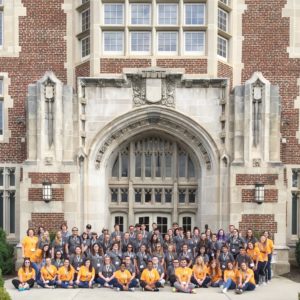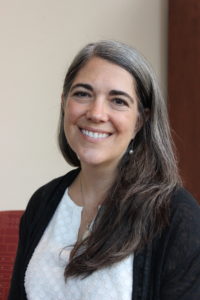The Success in Multidisciplinary Research award is given to a team of faculty members in more than one academic college who have succeeded in gaining major external resources and recognition for multidisciplinary research.
Melinda Gibbons and Erin Hardin

Melinda Gibbons is a professor of counselor education in the Department of Educational Psychology and Counseling. Erin Hardin is a professor and director of undergraduate studies in the Department of Psychology. Combining their expertise in vocational development among underserved groups, they have collaborated to increase career and educational equity and access for rural Appalachian residents, generating new knowledge about the barriers to educational and career equity and evidence-based interventions to decrease these barriers and increase access. Their partnership has led to three federally funded multiyear engaged scholarship grants that directly address these issues, with a new grant currently under review.
Their projects have involved faculty and staff in areas ranging from biotechnology and engineering to political science, as well as several graduate students and undergraduates from across the university. Their work to date has benefited more than 1,800 high school students and led to multiple peer-reviewed manuscripts and presentations.
How does your research benefit UT?
 Through building on strengths while also recognizing structural barriers, my research helps youth and emerging adults increase their career and educational knowledge, skills, and opportunities. I don’t work alone, so with my research partners, we have created multiple outreach programs that directly impact students. The FUTURE program provides postsecondary experience for students with intellectual and developmental disabilities. PiPES and ASPIRE provide postsecondary and STEMM (science, technology, engineering, math, medical) awareness and support programs for rural Appalachian students. All three programs also engage the UT community by including undergraduates, graduate students, and faculty to serve as near-peer mentors, research mentors, and programming staff.
Through building on strengths while also recognizing structural barriers, my research helps youth and emerging adults increase their career and educational knowledge, skills, and opportunities. I don’t work alone, so with my research partners, we have created multiple outreach programs that directly impact students. The FUTURE program provides postsecondary experience for students with intellectual and developmental disabilities. PiPES and ASPIRE provide postsecondary and STEMM (science, technology, engineering, math, medical) awareness and support programs for rural Appalachian students. All three programs also engage the UT community by including undergraduates, graduate students, and faculty to serve as near-peer mentors, research mentors, and programming staff.
—Melissa Gibbons
 Our research helps faculty, staff, and administrators better understand how to support student success. Much of our work combines research, intervention, and outreach throughout East Tennessee, not only helping to recruit new students to the university, but also enhancing the visibility of UT throughout the region.
Our research helps faculty, staff, and administrators better understand how to support student success. Much of our work combines research, intervention, and outreach throughout East Tennessee, not only helping to recruit new students to the university, but also enhancing the visibility of UT throughout the region.
—Erin Hardin